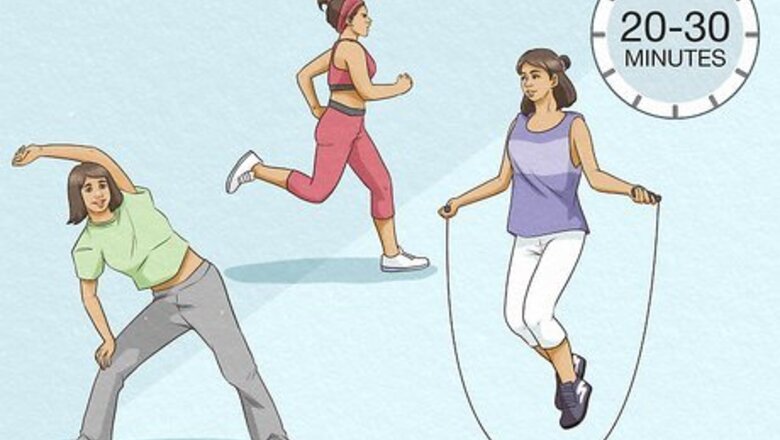
views
Do aerobic exercise.
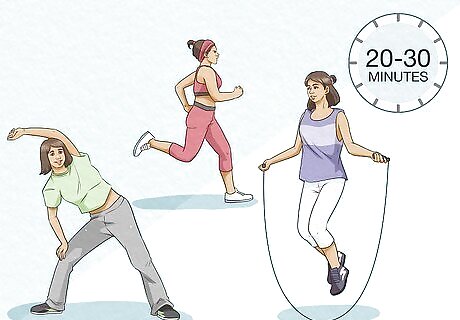
Aerobic exercise keeps your circulatory and respiratory systems fit. Your circulatory and respiratory systems deliver oxygen and nutrients throughout your body as well as remove waste. Keeping these systems fit and functioning requires cardiovascular exercise that raises your heart rate, such as walking, running, or swimming. Spend 20-30 minutes on this kind of exercise every day. Do this exercise in addition to your regular physical activity. For example, even if you spend several hours gardening, you still want to make time for a 20-minute walk or some other exercise. The best way to maintain this habit is to do something you enjoy doing. If you like playing soccer, join a community league and do drills on the days you don't have a game. Swimming is perhaps the best all-around workout. It's low impact, so it's great if you have painful or stiff joints.
Strengthen your core.
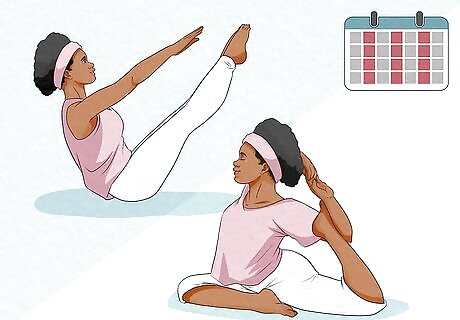
Core strength helps prevent back pain and balance issues as you age. Work core exercises into your exercise routine at least 2 or 3 days a week to keep the muscles in your midsection strong. You can do basic exercises, such as crunches and planks, but you might also try yoga or pilates. Tai chi is another option. This Chinese martial art not only strengthens your core but also improves balance and mental focus. Community classes are often available at little to no cost.
Lift light weights for endurance.
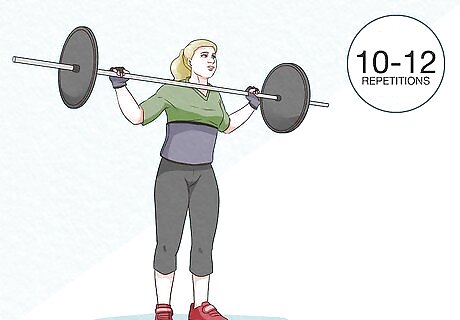
Fit muscles can perform repeated contractions for a longer period. Doing more repetitions with lighter weights helps build your muscular endurance. Start with a weight that makes your muscles feel tired after 10-12 repetitions. Learn and use the correct form for weight lifting exercises so you can do them properly. This ensures you get the full benefit and also lessens the risk of injury. Challenge your muscles by adding weight gradually. If you stay with the same weight, you won't get much benefit out of the exercise after a few weeks.
Build strength with heavy weights.
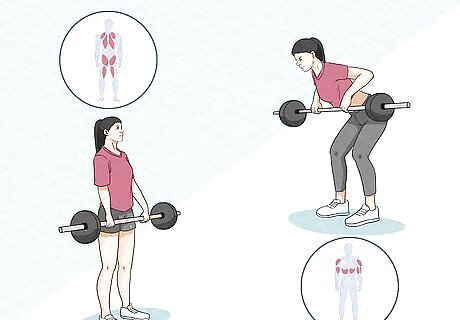
Target different muscle groups in each session for consistent strength. Lighter weights build endurance, but it takes fewer repetitions with heavier weights to increase the strength in your muscles. Start with the lowest weight that exhausts your muscles after 2 to 5 repetitions and gradually increase it. Your muscles need at least 48 hours to recover after a good workout—schedule your strength training sessions accordingly. You can typically maintain physical fitness with 2 or 3 sessions a week. Tom Brady Tom Brady, Professional Football Player Rest days are of paramount importance. "I firmly believe that sleep and recovery are critical aspects of an effective and holistic training program."
Stretch for flexibility.
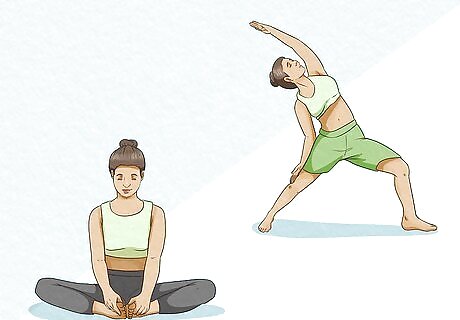
Stretches help maintain your full range of motion. Flexibility is incredibly important to your basic physical fitness, especially as you age. Because aerobic exercises and strength training naturally cause your muscles to contract and stiffen, stretch before and after you exercise as well. Starting a basic yoga practice is a great way to maintain your flexibility. Once you've learned a few poses, you can use them as warmup or cool-down stretches after exercise as well. Breathe freely and deeply through stretches. If you feel any pain or tension, stop. Stretches should never hurt.
Eat nutritional foods.
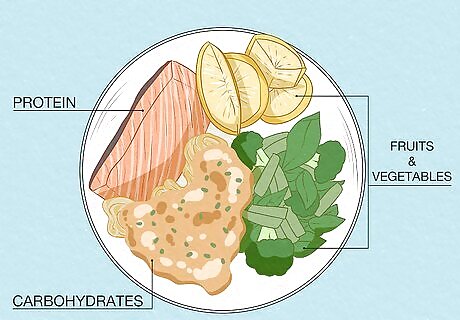
Proper nutrition keeps you healthy and improves your brain function. The ideal diet includes lots of fresh fruits and vegetables, whole grains, lean proteins, and healthy fats. Studies show a Mediterranean diet might be the healthiest eating style. Portion control is also important. Some foods you can eat without having to worry about the quantity. But in general, get in the habit of putting healthy portions on your plate and not returning for seconds. Eat fast food and sugary foods and drinks in moderation. These things are fine as an occasional treat but don't help your fitness when they're a regular part of your diet.
Limit consumption of alcohol and drugs.
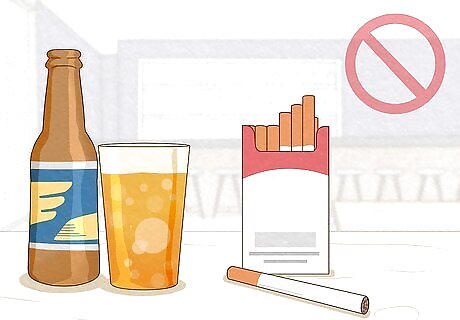
Alcohol and drugs can endanger your physical and mental health. Drinking alcohol contributes to poor physical health and can cause heart problems, especially as you age. Overuse or misuse of other drugs can also cause serious health problems and lead to anxiety and depression. If you drink regularly, try to cut back gradually—every little bit helps. Limit drinking to one or two drinks once or twice a week. If you have difficulty with this, it might be better for you to stop drinking entirely. If you smoke, make a plan to quit. Quitting smoking improves your physical fitness and lowers your risk of cancer, heart disease, stroke, and lung disease. It can also add years to your life expectancy!
Drink water to stay hydrated.
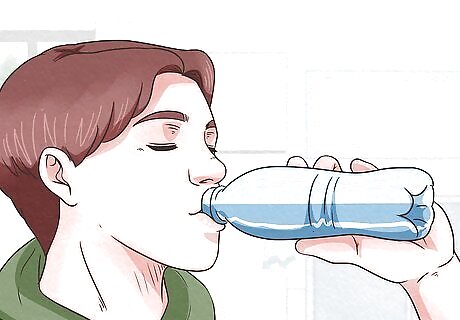
Plain water is your best bet to keep your body hydrated. Every part of your body needs water to function properly. While you do get some water from the foods you eat as well as from other drinks, make plain water your go-to. Your body uses it more efficiently. The specific amount of water you need to stay hydrated varies depending on your body size and activity level. Your urine is a good indication of your hydration level—if it's a dark yellow or amber color, you need more water. Always drink water before, during, and after a workout to help recover the water your body loses through sweat. Keep a bottle of water with you so you always have some handy. This will make it easier to remember to take small sips of water throughout the day.
Stay active throughout the day.
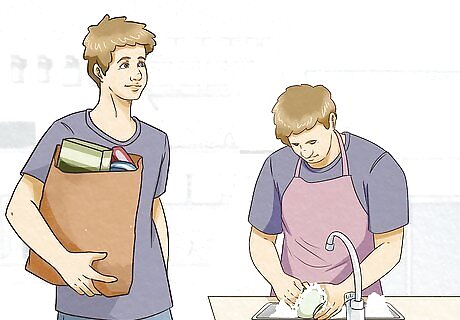
Try to be active for a total of at least an hour over the course of the day. Leading a sedentary lifestyle does great damage to your physical fitness. Even if you exercise regularly, you won't get the full benefit of that exercise if you're sedentary the rest of the time. Luckily, it is pretty easy to sneak activity into your day. Here are some ideas: Take the stairs instead of the elevator Work in the yard, gardening, mowing, or raking leaves Tidy up your home Wash and wax your car by hand Walk somewhere instead of driving
Get 7-9 hours of sleep every night.
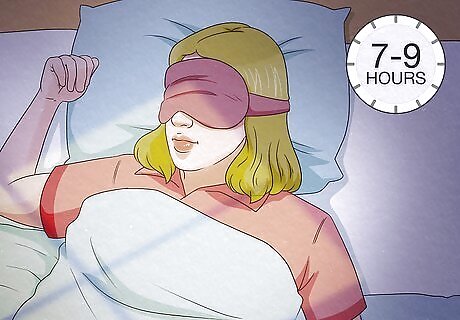
A good night's sleep helps restore energy and repair damage. A consistent sleep pattern will really help boost your physical health. Start winding down about an hour before you plan to go to bed—turn off the screens and read a book or listen to relaxing music. Try to go to bed at around the same time every night and wake up at around the same time every morning. This helps your body's circadian rhythm adjust so when it's time to go to bed, you'll actually be tired. Keep the room where you sleep quiet and dark. Having a light or the TV on makes it harder to go to sleep and fall into a deep sleep. If you're having a hard time going to sleep, get up and do something else for a few minutes until you feel tired. Tossing and turning in bed will only make things worse. Talk to your doctor if you have a recurring problem falling to sleep. They might recommend a sleep aid to help.
Spend time with friends and family.

Strong connections with others help sustain your mental health. Stress and your general mood have a big effect on your overall health. It's a big part of physical fitness, even if it's often overlooked. Having loving relationships keeps you from being isolated, which can put you at higher risk for depression and other health problems. If you can exercise or do other physical activities with friends or family members, you can effectively kill two birds with one stone. Their support will also really motivate you! Hobbies are another important part of mental health. Sharing your hobbies with others helps build friendship and camaraderie.
Get regular medical checkups.
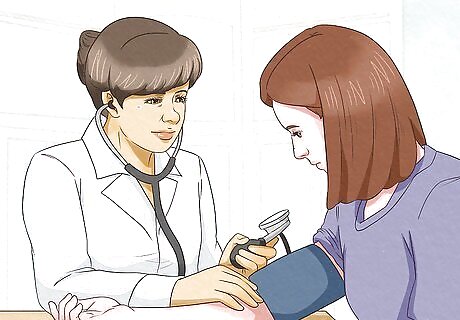
See your doctor at least once a year. Regular checkups help prevent health problems because your doctor can catch warning signs early. If you have a chronic health condition, you might need to see your doctor (or other specialists) more often. Seeing your doctor regularly establishes a regular relationship with them. If you're used to seeing them, you'll be more comfortable asking them questions.


















Comments
0 comment